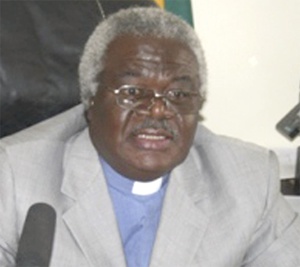The Moderator of the Presbyterian Church of Ghana, Prof. Emmanuel Martey, has described homosexuality as “satanic”.
He says gay practice is “Satan’s deadly agenda” with which Ghana could be destroyed, adding that: “This is the reason why acclaimed and notorious homosexuals want to attach themselves to Ghana’s presidency to gain access” into Ghana’s social fibre.
According to Prof. Martey, “all homosexuals want to meet in Ghana because of the country’s uniqueness”.
The issue of homosexuality has been a hotly debated issue in the country for the past few years.
It crops up intermittently in public discourse.
The debate got to a crescendo early this year when President John Mahama nominated human rights advocate, Nana Oye Lithur, as Minister of Gender, Children and Social protection.
She was bombarded with questions about her fight for the human rights of homosexuals.
The discourse assumed a political tone when internationally renowned gay rights advocate, Andrew Solomon, riposted claims that later turned out to be a faux pas on the part of Information and Media Relations Minister Mahama Ayariga that President Mahama had never met Mr. Solomon contrary to opposition claims that the two knew each other.
Solomon came into the picture following the circulation of a picture of himself and President Mahama at the launch of the latter’s book ‘My first coup d’etat’ in New York.
Prof. Martey says Ghana must not tolerate the “satanic practice” in any form or nuance and, therefore, urged all Ghanaian leaders to “wake up” against it.
He sounded the alarm when he spoke at the Osu Presbyterian Church, to mark the 31st anniversary of the extra-judicial killing of three High Court Judges and a retired army officer by the Rawlings-led Provincial National Defence Council military junta on June 30, 1982.
The anniversary of the killing of Justices Fred Poku Sarkodee, Cecilia Koranteng-Addow and Kwadwo Agyei Agyepong is remembered as Martyrs Day every year by the Ghana Bar Association and the Judiciary.
It has been described by historians as one of the darkest and bloodiest moments in Ghana’s political history.
General News of Sunday, 30 June 2013
Source: radioxyzonline

















